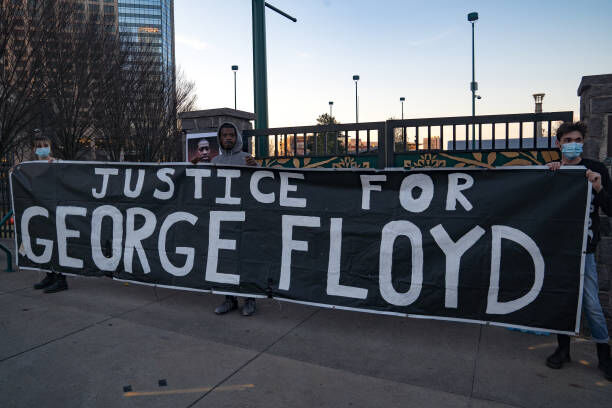House Passes George Floyd Justice in Policing 2020 Act
Courtesy of Megan Varner, Getty Images
The bill, which attempts to eliminate some of the many elements of systemic racism and inequity found in policing, is named in honor of George Floyd, whose murder at the hands of policemen sparked national outrage this summer.
March 10, 2021
On Wednesday, March 10, the United States House of Representatives passed the George Floyd Justice in Policing Act of 2020, an ambitious attempt to take apart, examine, and reconstruct policing nationwide. The bill, which attempts to eliminate some of the many elements of systemic racism and inequity found in policing, is named in honor of George Floyd, whose murder at the hands of policemen sparked national outrage this summer. Among the bill’s provisions are a national ban on chokeholds, the dissolution of “qualified immunity”, and the easing of standards to prosecute law enforcement officers who are accused of wrongdoing.
The bill passed 236 – 181, with nearly complete opposition from House Republicans. The three Republicans who joined House Democrats in supporting the bill were Brian Fitzpatrick of Pennsylvania, Will Hurd of Texas, and Fred Upton of Michigan.
Sponsored by Karen Bass D-CA, the bill “addresses a wide range of policies and issues
regarding policing practices and law enforcement accountability. It includes measures to increase accountability for law enforcement misconduct, to enhance transparency and data collection, and to eliminate discriminatory policing practices.”
In addition to subjecting law enforcement to rightful punishment for constitutional violations, the three main goals of the bill are to “lower the criminal intent standard — from willful to knowing or reckless — to convict a law enforcement officer for misconduct in a federal prosecution,” limit qualified immunity, and authorize the Department of Justice to issue subpoenas in investigations of police departments for allegations of discrimination.
The bill will also create the National Police Misconduct Registry, a national registry to compile data on records of police misconduct. Lastly, the bill establishes a framework to prohibit racial profiling, including implementing new requirements for implicit bias training and the use of body cameras.
“Today with the George Floyd Justice in Policing Act, the House is honoring his life and the lives of all those killed by police brutality and pledging: Never again,” House Speaker Nancy Pelosi said at a press event before the vote. “When we pass this bill, the Senate will have a choice: to honor George Floyd’s life or to do nothing.”
The Floyd family released a statement saying that the House was “responding to the mandate issued by thousands of Americans who took to the streets last summer to raise their voices for change.”
It went on to say that “this represents a major step forward to reform the relationship between police officers and communities of color and impose accountability on law enforcement officers whose conscious decisions preserve the life or cause the death of Americans, including so many people of color. Now we urge the Senate to follow suit.”
However, it is unlikely that the bill will achieve the 60 votes necessary to pass in the Senate, which is currently split 50-50.
“The House will do its duty and pass the Justice in Policing bill today. I hope the Senate will do the same, but I fear it will not,” House Judiciary Chairman Jerry Nadler said.
“This is not the time for half measures, this is not the time for further, it’s not the time for sham and fake reform. The Senate bill is sham and fake reform. It gestures, uses some of the same words, but it does nothing real,” Nadler said, in reference to the GOP’s earlier attempt at a police reform bill, which was rejected by House Democrats in June.
“I am really disappointed to say that I don’t think the George Floyd Justice in Policing Act will pass in the Senate. It’s difficult how many conversations about and attempts for change we have, but how little follow-through there actually is,” freshman Kate Flynn shared.
However, students remain hopeful.
“I think [the act] is a good reminder that the events of last year will never be forgotten and as long as people have it in mind, change will be inevitable. Sure it might not accomplish all that there is to be accomplished, but that’s unavoidable. It’s a huge step forward and as long as legislators keep the events of 2020 in mind when making policing policies our country will improve,” freshman Craig Newton expressed.








